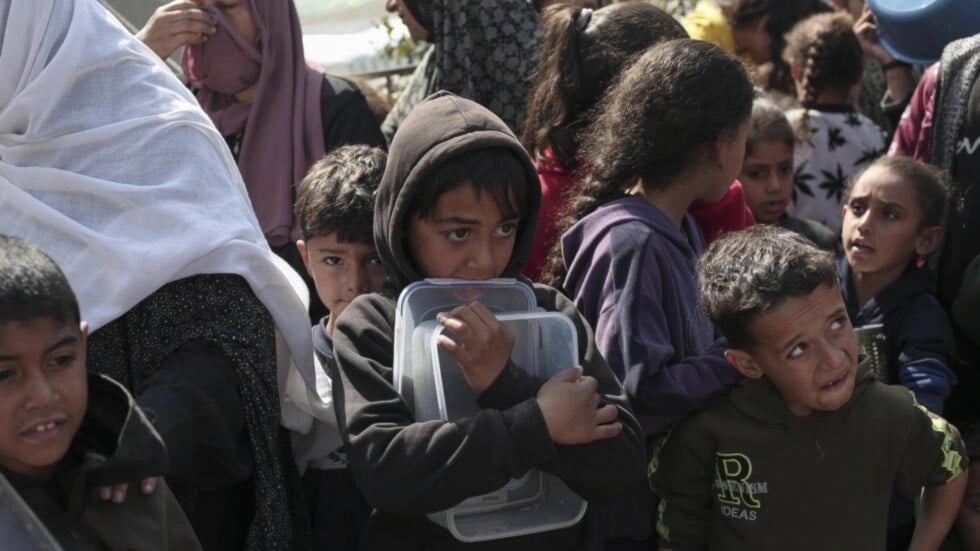Aid corridor urgent need to prevent famine in North Gaza: WFP official
The World Food Programme country director for Palestine emphasizes the urgent requirement for an aid corridor into northern Gaza to avert a "man-made" famine.
-

Palestinian children wait for aid amid “man-made” famine due to the ongoing Israeli genocide and total blockade. (AFP)
The killing of over 100 Palestinians, as Israeli soldiers fired upon them while they were waiting in line for much-needed aid from convoys, was a "tragedy that could have been foreseen and prevented," as stated by the World Food Programme Country Director for Palestine.
Matthew Hollingworth emphasized the urgent requirement for an aid corridor into northern Gaza to avert a "man-made" famine. This necessity arises from the rapid and widespread starvation of Palestinians.
"To have a situation today with half a million people facing famine in just five months is extraordinary at that scale,” he said.
“There’s nowhere else in the world today with this many people at risk of famine. Nowhere. And it’s all man-made,” he added.
In late February, the WFP suspended food deliveries to northern Gaza, even in the face of imminent starvation. This decision was made after Israeli forces fired at desperate Palestinians attempting to obtain food from WFP trucks at the same location, according to Hollingworth.
“Sadly, from our perspective, the entire reason why we came to a temporary suspension is because we feared something like that would happen,” he said in an interview at the WFP’s office in occupied al-Quds.
GAZA CIVIL DEFENSE: The occupation repeatedly targets those seeking aid.
— The Palestine Chronicle (@PalestineChron) March 4, 2024
FOLLOW OUR LIVE BLOG: https://t.co/9Ii9jso5kG pic.twitter.com/u7mem9wpU0
"We had been in two situations, over two consecutive days, where shots were fired when people got too close to the military checkpoint and when people rushed the trucks,” he detailed.
The decision, which was made on February 19, “was founded on a fear that further beneficiaries would be killed attempting to get assistance directly off the trucks we took in,” he said.
Read next: 'Israel' starves another child to death, children starved now at 16
'People are genuinely facing starvation'
According to the UN, the EU, and eyewitnesses in Gaza, numerous individuals attempting to access aid from trucks last Thursday were shot by Israeli occupation forces.
Hollingworth emphasized the necessity of inundating the northern part of the territory with aid to stabilize the situation. He noted that people would cease risking their lives for aid once they secured several days' or weeks' worth of food and were assured of a functioning aid pipeline.
He approximated that an immediate and sustained effort, consisting of a minimum daily supply of 600 tonnes of food aid delivered by 30 trucks over the course of 10 days, would be necessary.
The WFP has engaged in discussions with communities in Gaza City and the Israeli military to find a safe way to resume deliveries, although the recent Israeli massacres have hindered progress.
"I’m still confident we can restart, and we will restart. We have to. People are genuinely facing starvation in Gaza City,” Hollingworth said.
Currently, the WFP reportedly provides insufficient food for approximately 1.1 million individuals each month in Gaza, collaborating closely with UNRWA, the UN agency for Palestine, which also sustains around 1.1 million people. However, only a minimal fraction of the food aid transported into southern Gaza from the Egyptian border has reached the northern areas, where the level of hunger is most severe, as noted by Hollingworth.
Hollingworth mentioned that the WFP has 550 trucks stationed in El Arish, loaded with food and ready to proceed once there is improved access. The number of aid trucks entering Gaza dwindled to around 100 per day in February, less than half of the levels observed in January. He explained that bottlenecks at Israeli checkpoints for aid entering Gaza, security issues in a lawless 4km stretch between the border and Rafah, and logistical challenges of navigating through bombed-out streets filled with forcibly displaced Palestinians and communities experiencing widespread hunger are causing delays in aid shipments.
The images of Yazan spoke volumes to the entire world.
— Al Mayadeen English (@MayadeenEnglish) March 4, 2024
Sadly, Yazan al-Kafarna passed away in #Rafah this morning due to starvation caused by the Israeli occupation's siege.
Just days ago, Yazan's father shared a heartbreaking video on social media, showing pictures of Yazan… pic.twitter.com/zL1QQvHt9a
“We have trucks that have been queueing to cross for a week or 10 days, and then they do cross and that can take 24 hours to 48 hours” to go through Israeli checks, he stressed.
These delays occur in part due to the six loading and unloading processes that the cargo undergoes. The supplies must first be unloaded from Egyptian trucks into designated "sterile" trucks that exclusively operate within the crossing area. Subsequently, they are transported to a checkpoint where the contents undergo another unloading for meticulous inspection.
If the items successfully pass the inspection – and any single item rejected by Israeli occupation authorities results in the entire truck being sent back – they must undergo additional loading onto "sterile" trucks. These are then transported to the Gaza border, where they are unloaded once more and reloaded onto trucks that operate within Gaza.
Once on those trucks, a supply corridor is available up to the outskirts of Rafah.
“It takes seven to 10 days between departing from, let’s say, the port of El Said or the hub in El Arish to actually crossing into Rafah,” he said.
"The one thing we want to call for more than anything else is a cessation of hostilities. If there’s a ceasefire tomorrow, that’s a gamechanger,” Hollingworth said.
“You can then work in a completely different way … to improve the situation and start rebuilding people’s lives and hope and dignity,” he concluded.
Read next: 'Israel' deliberately attempting to exacerbate famine: Gaza Media

 5 Min Read
5 Min Read








